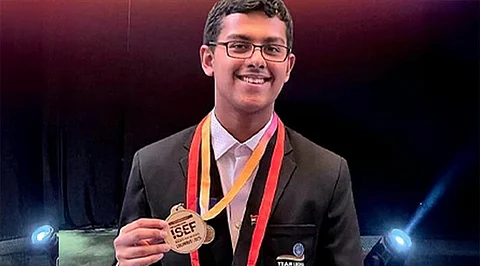

16-year-old Pranet Khetan, class XI student of Shiv Nadar School, Gurugram, has developed an automatic speech recognition (ASR) system “Paraspeak” which records slurred or dysarthric speech of stroke survivors, patients with paralysis, Parkinson’s, cerebral palsy, and other neurological disorders and instantly converts it into clear and intelligible speech. By enabling real-time communication, this device bridges a critical gap for individuals with speech impairments, empowering them to express themselves more effectively and confidently.
This pocket-sized device uses deep learning, transfer learning, and a custom-built dataset of dysarthric Hindi speech to train a speech-to-text model that converts garbled speech into coherent output. The converted speech is then played out clearly for others to understand. This innovation is first to focus on Hindi language dysarthic speech making it more inclusive and accessible. By leveraging artificial intelligence and deep learning, Pranet has developed a low-cost device that works in native languages and can be produced for under Rs 2,000.
Speaking about his innovation Pranet said: “Currently, there is no marketed solution for dysarthric speech recognition in any language except English; and none that are accessible at low cost. To address this gap, I built the largest known dataset of Hindi dysarthric speech, comprising 42 minutes of recordings from 28 patients. Using custom data filtration and augmentation pipelines, I expanded this dataset to generate over 20 hours of high-quality synthetic data. Leveraging a technique called transfer learning, I fine-tuned an open-source transformer-based deep learning model called whisper-medium for dysarthric speech recognition. The prototype device can record dysarthric speech, upload it to a cloud server running my AI model, download the converted, clear speech and play it out for everyone to hear in real-time”.
Pranet spent around one-year building ‘Paraspeak’ from scratch, combining his interests in artificial intelligence and assistive technology. The idea was sparked during a visit to a paralysis care centre, where he observed that dysarthria, a condition causing slurred speech due to muscle control issues, was a common symptom across a range of neurological disorders. Motivated to address this unmet need, he focused his research on building an accessible, affordable speech recognition system for underserved languages and communities.
Sameer Arora, Principal, Shiv Nadar School Gurgaon said, “Pranet’s creation is a remarkable example of how empathy can fuel innovation. His work exemplifies the spirit of innovation and empathy that we strive to nurture in our students. At Shiv Nadar School, we believe in empowering students to solve real-world challenges, and 'Paraspeak' is a shining reflection of that vision bridging technology and humanity to give voice to those unheard.”
Unlike commercial voice assistants such as Siri, Alexa, or Google Assistant which fail to recognize impaired speech, this ASR model is built specifically to process and understand dysarthric speech patterns. The model achieved over 90% accuracy during validation testing, despite the absence of any publicly available Hindi dysarthria datasets. The device has already been tested with actual patients, including one with a congenital disorder who responded with “constant thumbs-ups and smiles” when he realized he was finally understood.
This system holds promise for a range of real-world applications enabling users to send messages, control smart devices, participate in conversations, and even make emergency calls. Pranet Khetan’s novel Project “Paraspeak” has earned international acclaim at the Regeneron International Science and Engineering Fair (ISEF) 2025 in Ohio, USA. Competing against over 1,600 students from more than 60 countries, Pranet received the Fourth Grand Award in the Biomedical Engineering category, along with an Honourable Mention – Special Award from the International Council on Systems Engineering (INCOSE).
Supported by his mentor Mr. Nitesh Kumar, Principal Mr. Sameer Arora, and his parents, Pranet plans to expand the scope of this work, with the hope of positively impacting countless lives.
